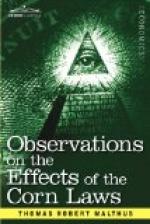On the other hand, those who contend for a continuance and increase of restrictions upon importation, must not imagine that the present state of agriculture and its present rate of eminence can be maintained without injuring other branches of the national industry. It is certain that they will not only be injured, but that they will be injured rather more than agriculture is benefited; and that a determination at all events to keep up the prices of our corn might involve us in a system of regulations, which, in the new state of Europe which is expected, might not only retard in some degree, as hitherto, the progress of our foreign commerce, but ultimately begin to diminish it; in which case our agriculture itself would soon suffer, in spite of all our efforts to prevent it.
If, on weighing fairly the good to be obtained and the sacrifices to be made for it, the legislature should determine to adhere to its present policy of restrictions, it should be observed, in reference to the mode of doing it, that the time chosen is by no means favourable for the adoption of such a system of regulations as will not need future alterations. The state of the currency must throw the most formidable obstacles in the way of all arrangements respecting the prices of importation.
If we return to cash payments, while bullion continues of its present value compared with corn, labour, and most other commodities; little alteration will be required in the existing corn laws. The bullion price of corn is now very considerably under sixty three shillings, the price at which the high duty ceases according to the Act of 1804.
If our currency continues at its present nominal value, it will be necessary to make very considerable alterations in the laws, or they will be a mere dead letter and become entirely inefficient in restraining the importation of foreign corn.
If, on the other hand, we should return to our old standard, and at the same time the value of bullion should fall from the restoration of general confidence, and the ceasing of an extraordinary demand for bullion; an intermediate sort of alteration will be necessary, greater than in the case first mentioned, and less than in the second.
In this state of necessary uncertainty with regard to our currency, it would be extremely impolitic to come to any final regulation, founded on an average which would be essentially influenced by the nominal prices of the last five years.
To these considerations it may be added, that there are many reasons to expect a more than usual abundance of corn in Europe during the repose to which we may now look forward. Such an abundance(3*) took place after the termination of the war of Louis XIV, and seems still more probable now, if the late devastation of the human race and interruption to industry should be succeeded by a peace of fifteen or twenty years.




